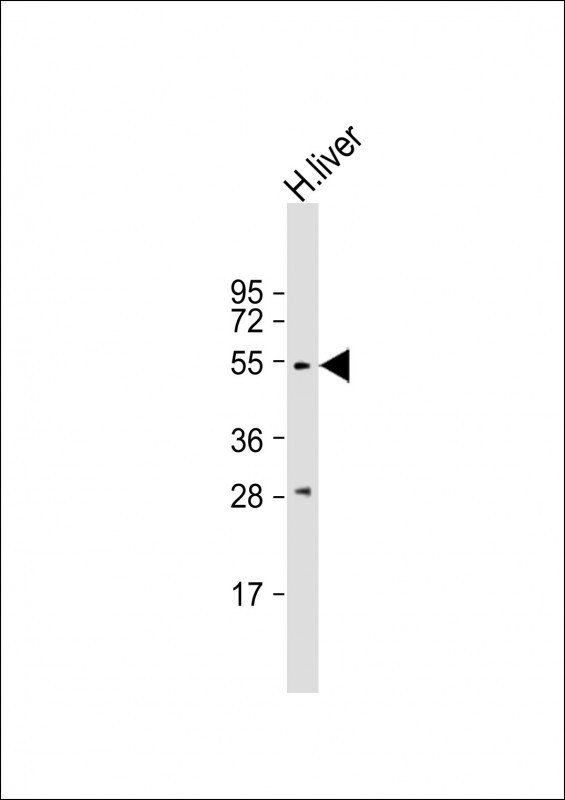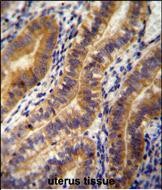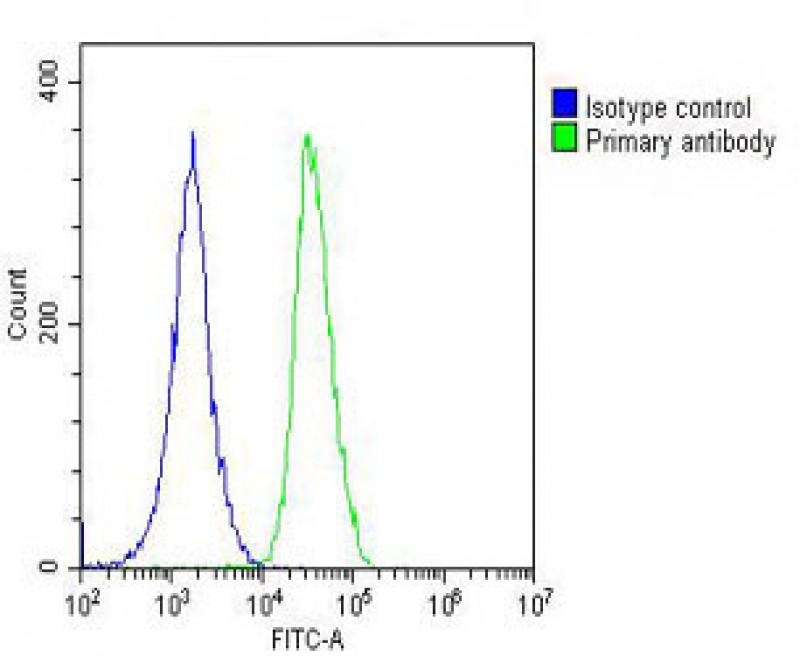ANGPT2 Antibody (C-term)
Affinity Purified Rabbit Polyclonal Antibody (Pab)
- SPECIFICATION
- CITATIONS: 2
- PROTOCOLS
- BACKGROUND

Application
| WB, IHC-P, FC, E |
|---|---|
| Primary Accession | O15123 |
| Other Accession | NP_001138.1 |
| Reactivity | Human, Mouse |
| Host | Rabbit |
| Clonality | Polyclonal |
| Isotype | Rabbit IgG |
| Calculated MW | 56919 Da |
| Antigen Region | 404-432 aa |
| Gene ID | 285 |
|---|---|
| Other Names | Angiopoietin-2, ANG-2, ANGPT2 |
| Target/Specificity | This ANGPT2 antibody is generated from rabbits immunized with a KLH conjugated synthetic peptide between 404-432 amino acids from the C-terminal region of human ANGPT2. |
| Dilution | WB~~1:2000 IHC-P~~1:50~100 FC~~1:25 E~~Use at an assay dependent concentration. |
| Format | Purified polyclonal antibody supplied in PBS with 0.09% (W/V) sodium azide. This antibody is purified through a protein A column, followed by peptide affinity purification. |
| Storage | Maintain refrigerated at 2-8°C for up to 2 weeks. For long term storage store at -20°C in small aliquots to prevent freeze-thaw cycles. |
| Precautions | ANGPT2 Antibody (C-term) is for research use only and not for use in diagnostic or therapeutic procedures. |
| Name | ANGPT2 |
|---|---|
| Function | Binds to TEK/TIE2, competing for the ANGPT1 binding site, and modulating ANGPT1 signaling (PubMed:15284220, PubMed:19116766, PubMed:19223473, PubMed:9204896). Can induce tyrosine phosphorylation of TEK/TIE2 in the absence of ANGPT1 (PubMed:15284220, PubMed:19116766, PubMed:19223473, PubMed:9204896). In the absence of angiogenic inducers, such as VEGF, ANGPT2-mediated loosening of cell-matrix contacts may induce endothelial cell apoptosis with consequent vascular regression. In concert with VEGF, it may facilitate endothelial cell migration and proliferation, thus serving as a permissive angiogenic signal (PubMed:15284220, PubMed:19116766, PubMed:19223473, PubMed:9204896). Involved in the regulation of lymphangiogenesis (PubMed:32908006). |
| Cellular Location | Secreted. |

Provided below are standard protocols that you may find useful for product applications.
Background
The protein encoded by this gene is an antagonist of angiopoietin 1 (ANGPT1) and endothelial TEK tyrosine kinase (TIE-2, TEK). The encoded protein disrupts the vascular remodeling ability of ANGPT1 and may induce endothelial cell apoptosis. Three transcript variants encoding three different isoforms have been found for this gene.
References
Morrissey, C., et al. Prostate 70(16):1799-1808(2010) Romero, R., et al. Am. J. Obstet. Gynecol. 203 (4), 361 (2010) : Bento, C.F., et al. Exp. Physiol. 95(9):955-970(2010) Vrbacky, F., et al. Hematology 15(4):210-214(2010) Chen, J., et al. Biochem. Biophys. Res. Commun. 398(2):212-216(2010)
If you have used an Abcepta product and would like to share how it has performed, please click on the "Submit Review" button and provide the requested information. Our staff will examine and post your review and contact you if needed.
If you have any additional inquiries please email technical services at tech@abcepta.com.














 Foundational characteristics of cancer include proliferation, angiogenesis, migration, evasion of apoptosis, and cellular immortality. Find key markers for these cellular processes and antibodies to detect them.
Foundational characteristics of cancer include proliferation, angiogenesis, migration, evasion of apoptosis, and cellular immortality. Find key markers for these cellular processes and antibodies to detect them. The SUMOplot™ Analysis Program predicts and scores sumoylation sites in your protein. SUMOylation is a post-translational modification involved in various cellular processes, such as nuclear-cytosolic transport, transcriptional regulation, apoptosis, protein stability, response to stress, and progression through the cell cycle.
The SUMOplot™ Analysis Program predicts and scores sumoylation sites in your protein. SUMOylation is a post-translational modification involved in various cellular processes, such as nuclear-cytosolic transport, transcriptional regulation, apoptosis, protein stability, response to stress, and progression through the cell cycle. The Autophagy Receptor Motif Plotter predicts and scores autophagy receptor binding sites in your protein. Identifying proteins connected to this pathway is critical to understanding the role of autophagy in physiological as well as pathological processes such as development, differentiation, neurodegenerative diseases, stress, infection, and cancer.
The Autophagy Receptor Motif Plotter predicts and scores autophagy receptor binding sites in your protein. Identifying proteins connected to this pathway is critical to understanding the role of autophagy in physiological as well as pathological processes such as development, differentiation, neurodegenerative diseases, stress, infection, and cancer.




